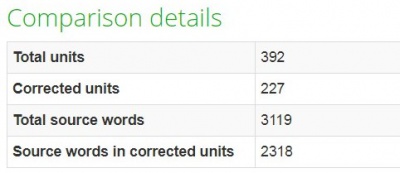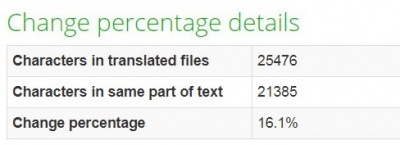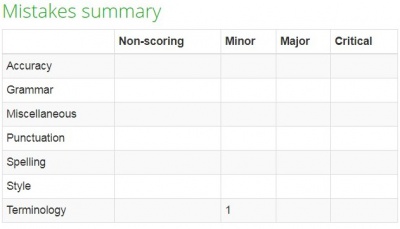Difference between revisions of "Project details"
(→Evaluation details) |
(→Evaluation sample details) |
||
| Line 97: | Line 97: | ||
*'''Total units''' - the quantity of text segments in the sample source. | *'''Total units''' - the quantity of text segments in the sample source. | ||
| − | *'''Total source words''' - | + | *'''Total source words''' - the total quantity of words in the sample source. |
*'''Comment''' - a note entered by the evaluator. | *'''Comment''' - a note entered by the evaluator. | ||
Revision as of 16:26, 1 December 2017
Project details page: http://cloud.tqauditor.com/project/view?id=XXXX (replace XXXX with a valid number)
The manager can control the project — download project files, reassign participants (manager, translator, evaluator or arbiter) or delete this project at all.
Note: Evaluator (not manager) uploads the files. Manager (if he has not assigned himself as project evaluator) may only download them if needed.
Now, the project has been created, and manager can forget about it.
The system sends an email notification to the project evaluator, who has to follow the instructions from the next chapter.
Project details are divided into several blocks:
Contents
Project details
- ID - unique project number, generated by the system.
- TMS translation job code - translation job ID, entered by the manager.
- TMS review job code - review job ID, entered by the manager (differs from translation job code).
- Specialization - translation specialization (you may add a new one if needed: System => Specialization => New specialization).
- Language pair - source and target languages.
- CAT word count - the number of words the translator is paid for.
- Stage - shows the progress of the project.
- Created at - project start date and time.
Project participants
- Project manager - the supervisor of the project.
- Project manager email - email of the project supervisor.
- Project translator - user, that performs the translation.
- Project evaluator - user, that estimates translator’s work.
- Project arbiter - user, that makes a final decision in dispute situations between translator and evaluator.
Comparison details
- Total units - total quantity of segments.
- Corrected units - the quantity of segments with amendments.
- Total source words - full quantity of words in the source.
- Source words in corrected units - the quantity of source words in amended segments.
Change percentage details
- Characters in translated files - quantity of symbols in translated files.
- Characters in same part of text - quantity of symbols in the same part of the text.
- Change percentage - the share of changed part.
Evaluation details
- Evaluation count - the quantity of times translation was sent on reevaluation/arbitration.
- Skip locked units - hidden, "frozen" units (for example the client wants some parts, extremely important for him, stayed unchanged and blocks them, and extra units slow down editor’s work).
- Skip segments with match >= - predefined fuzzy match percentage (the program hides segments with match greater than or equal to, that you specified).
- Total units - the total quantity of text segments.
- Corrected units - the quantity of segments with amendments
- Total source words - the total quantity of words in the source.
- Source words in corrected units - the quantity of source words in amended segments.
- Quality score - the complex index of performing translation that depends on the total quantity of words, specialization, the severity of mistakes, etc.
- Quality mark - the evaluation of translator.
Evaluation sample details
- Total units - the quantity of text segments in the sample source.
- Total source words - the total quantity of words in the sample source.
- Comment - a note entered by the evaluator.
- Total mistakes - general quantity of mistakes.
- Mistakes commented by translator - quantity of mistakes with translator's notes.
Mistakes summary
Here you may find the mistakes classified by gravity (Non-scoring, Minor, Major, Critical)
and type (Accuracy, Grammar, Miscellaneous, Punctuation, Spelling, Style, Terminology).


